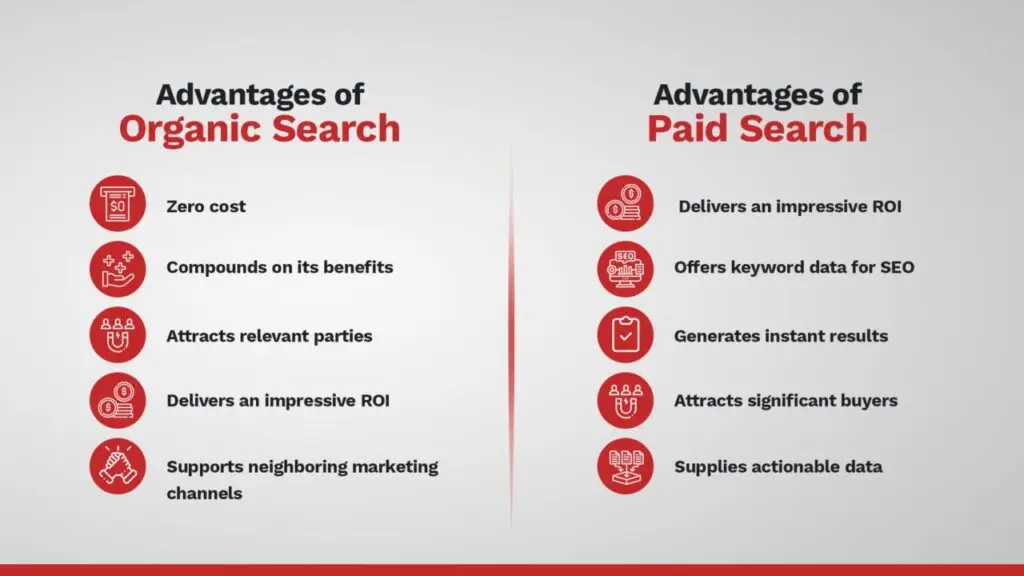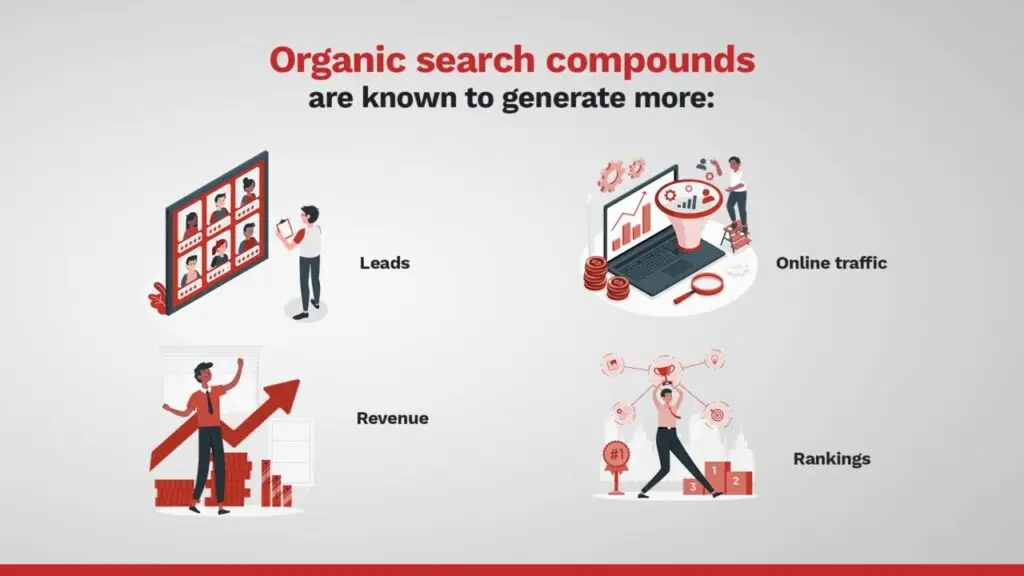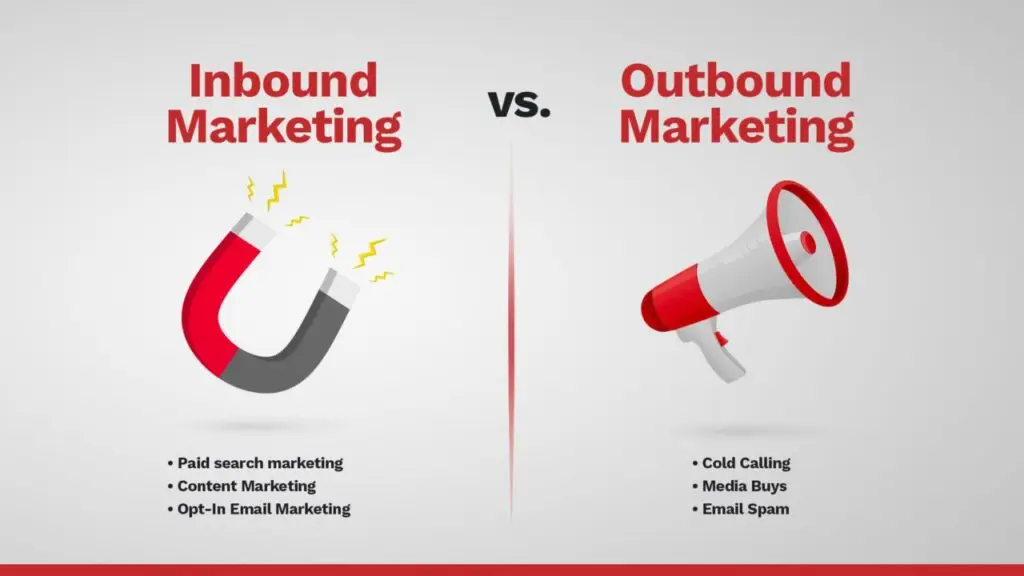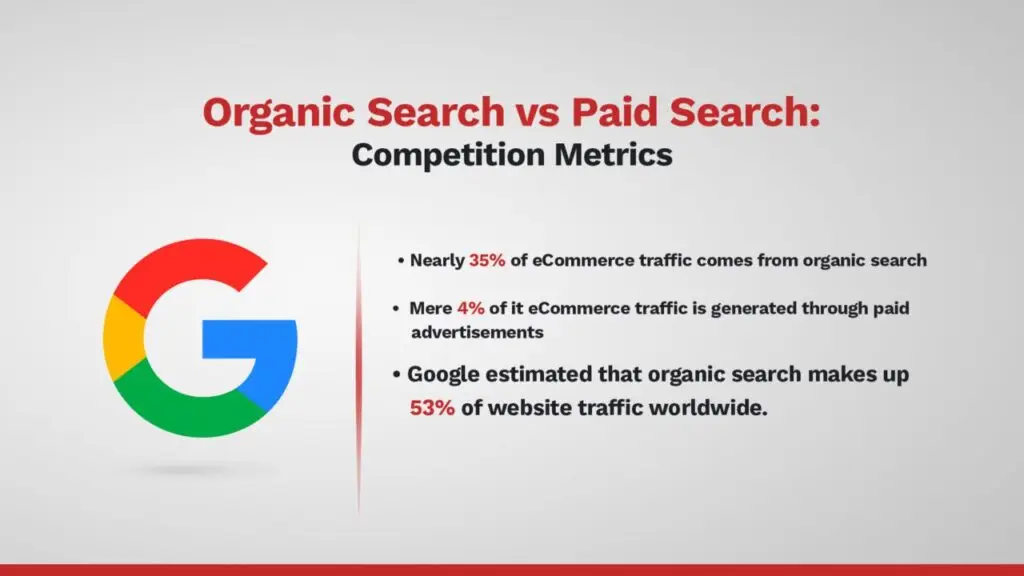Both organic and paid search can be a great revenue source for any business. If your customers are searching for your services online, you must do the necessary to make sure your website appears before them. Organic and paid search marketing is either of the two options you have at your disposal. While organic search primarily focuses on free, unpaid rankings, paid search centers on paid rankings. Companies use SEO, or search engine optimization, to optimize their website’s public visibility.
What Exactly is the Difference?

When it comes to organic search vs paid search, both individually offer a set of unique benefits.
The advantages of organic search are:
- Zero cost
- Compounds on its benefits
- Attracts relevant parties
- Delivers an impressive ROI
- Supports neighboring marketing channels
The advantages of paid search are:
- Delivers an impressive ROI
- Offers keyword data for SEO purposes
- Generates instant results
- Attracts significant buyers
- Supplies actionable data
With nearly 70% of paid search impressions taking place on mobile, 77% of users can confidently recognize paid search ads as opposed to organic results. Keep in mind that a whopping 90% of marketers claim SEO is successful long-term.
Regardless of organic search vs paid search, you’re interested in a return on your efforts. It’s easy to measure the return on investment through SEO strategies. With a little research, you’ll find that SEO has helped countless brands and companies generate better numbers in a matter of months.
Organic Search Compounds

Organic search vs paid search is a fiery debate in the digital climate. While businesses scramble to figure out the better alternative of the two, the numbers are painting the real picture. Organic search compounds are known to generate more:
- Leads
- Revenue
- Online traffic
- Rankings
Better yet, companies don’t pay for the benefits of organic search. Google processes around 70,000 search queries every second, with 53% of website traffic coming from organic searches.
Organic search vs paid search – a prevalent debate for marketers everywhere. Searches with at least four words have a higher chance of generating clicks on your website, especially if you’re not one of the top-ranked sites. Keywords consisting of four or more have a CTR twice as high as one-worded keywords.
With 49% of online marketers in favor of organic search, it attracts relevant users to your company’s website. That said, you’re far more likely to experience a rise in conversion rates based on organic search results alone.
Credibility
In the eyes of an online user, organic search increases a brand’s credibility significantly. Whatever the user is searching for, your company makes a memorable first impression when it appears at the top of the organic search results. While paid ads target a specific audience through multiple digital strategies, the approach isn’t exactly a common one.
Relevance
In the organic search vs paid search debate, organic search helps businesses reach users that are more likely to be interested in its content. Natural search includes a wide array of searches without any upfront costs. Incredibly, organic search allows any business to maximize its online presence amongst search results related to its niche.
61% of users have said they favor businesses that produce original, unique content over businesses that don’t.
Paid search generates instant results at exceptional rates. That said, paid search has a faster turnaround time than organic search. When a business advertises through a series of paid channels, results appear as soon as the ads go live on the internet. In just a matter of minutes, Google and Facebook will approve its campaigns. With a fast approval time, the company’s revenue stream will also witness results faster than organic search. Call it a business investment.
Over 7 million advertisers worldwide invested a whopping $10.01 billion in PPC in 2017. That number has more than quadrupled since. 79% of marketers agree that PPC is extremely beneficial for their business, according to Hanapin Marketing in 2019.
How to Run Organic Campaigns vs Paid Campaigns
When running an organic promotional campaign, brands must target a specific audience that has a positive correlation with their niche. They must establish a connection with consumers, meaning:
- Post consistently on social media
- Use relevant hashtags
- Develop creative ad copy
- Formulate a theme for your brand’s website and social platforms
Paid campaigns are a quicker, more aggressive way to target consumers. They require a budget that’s financially realistic yet effective. Paid ads are displayed on search engine result pages, or SERPs, along with social media channels.
During the process of creating paid ads, the brand selects a certain channel, like Google Ads or Facebook, and then specifies the target audience based on:
- Location
- Personal interests
- Search terms
- Previous purchases
- Demographics
Paid advertisements will run until the company’s budget has been used up.
Inbound and Outbound Marketing

Inbound marketing specifically involves creating and distributing content that attracts people to a brand’s website. In the process of outbound marketing, companies reach out to consumers in an effort to get them interested in a product.
Organic Search vs Paid Search: Competition Metrics

Time is money; you want to limit the number of risks you take in business. That said, who wins the organic search vs paid search argument? Nearly 35% of eCommerce traffic comes from organic search, while a mere 4% of it is generated through paid advertisements.
However, organic leads lose at a rate of 14.6%. Outbound marketing loses at a much lower rate of 1.7%. Google estimated that organic search makes up 53% of website traffic worldwide.
In a similar style to organic search, paid search can also provide your brand with actionable data. Using keywords and demographics makes it possible to incorporate profitable value into your paid campaigns. For example, your brand may need to conjure up new ideas for ad copy in response to a poorer click-through rate on an advertisement. Depending on the changes and results generated, your company can successfully apply these changes in other equally beneficial areas.
Marketing Channels
A company’s organic search initiatives can be supported by its social marketing campaign, depending on the initial approach. Both parties claim this miraculous advantage in the organic search vs. paid search debate. With organic search, you can repurpose content for all of your social media platforms. Establish a connection between posts on all marketing channels to forge a relationship with consumers.
With paid search, a brand’s approach can positively affect many channels, including:
- Social media
- Organic
When a brand incorporates keyword data into its content, it can garner valuable leads, which eventually morph into loyal consumers.
Which One to Choose
While organic search and paid search differ in various ways, both supply fantastic advantages for any business. Depending on your company’s financial standing, organic search may be the better option. However, paid search is a viable alternative if a brand is willing to make a business investment to grow its audience.
